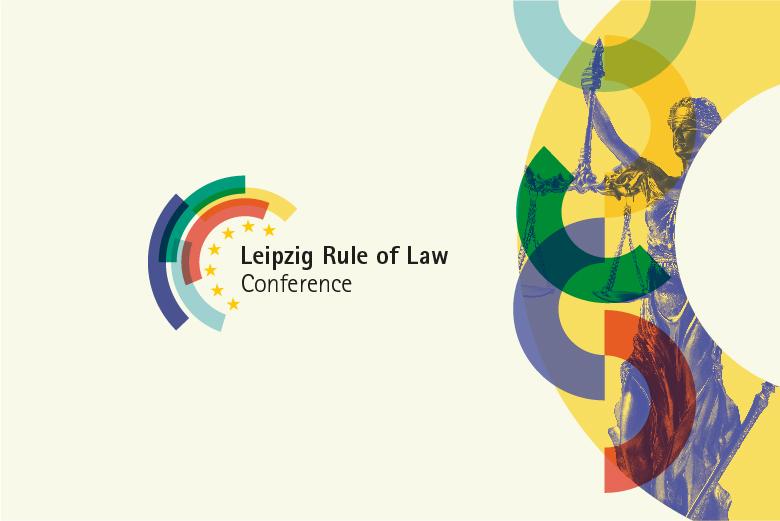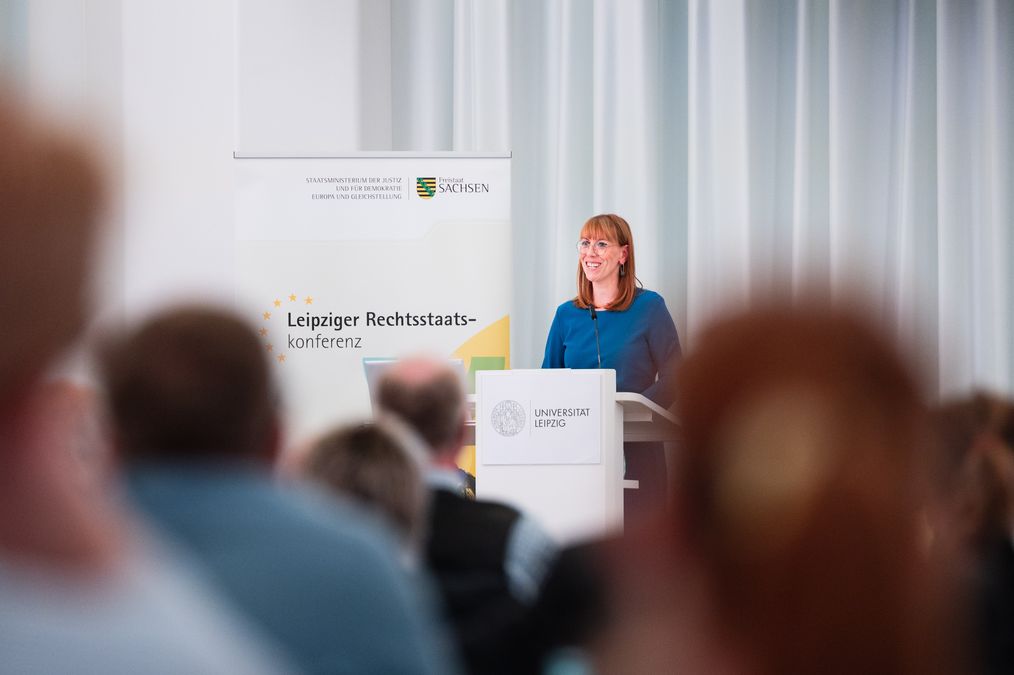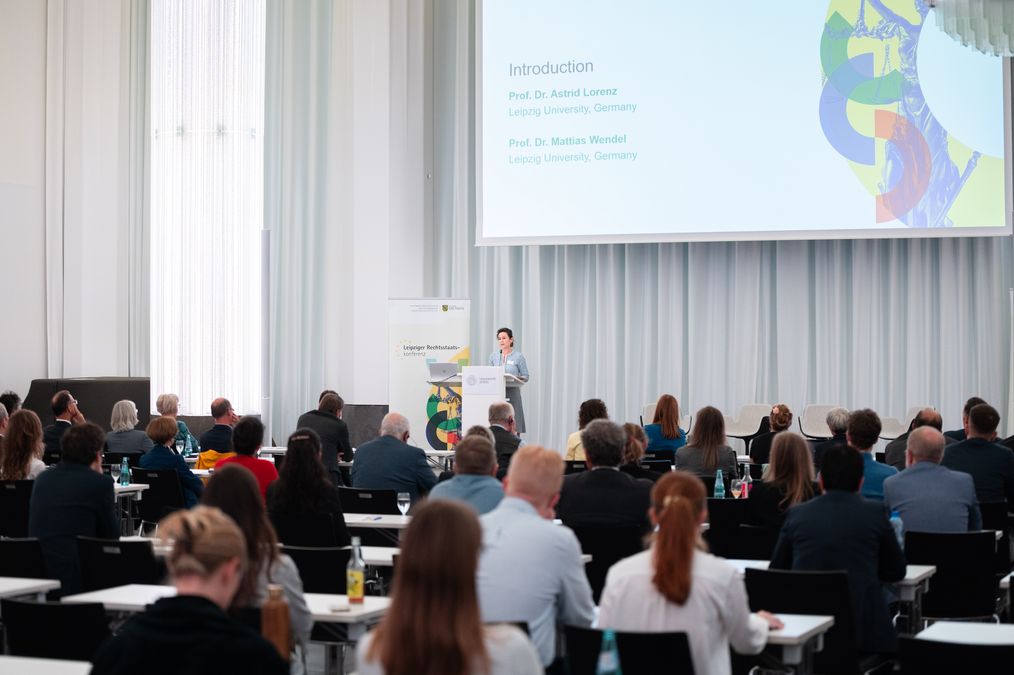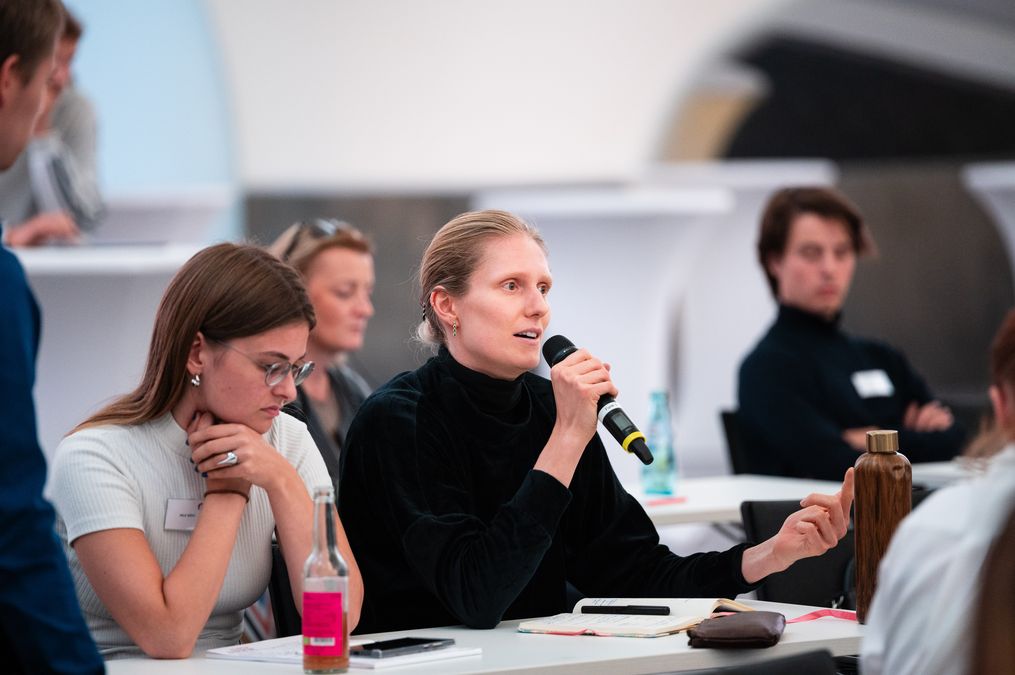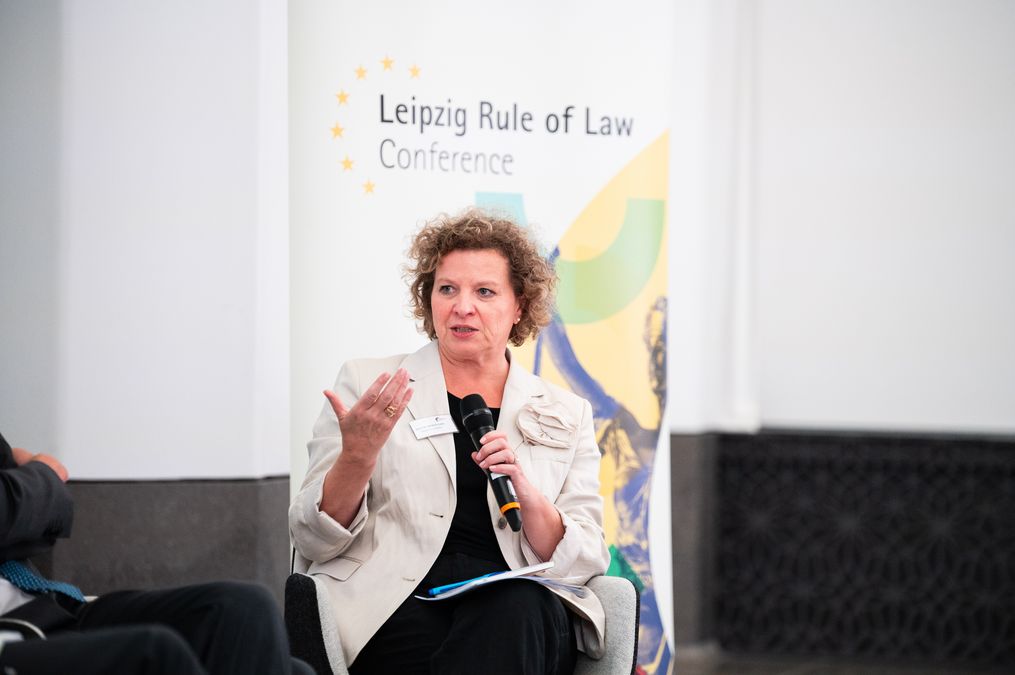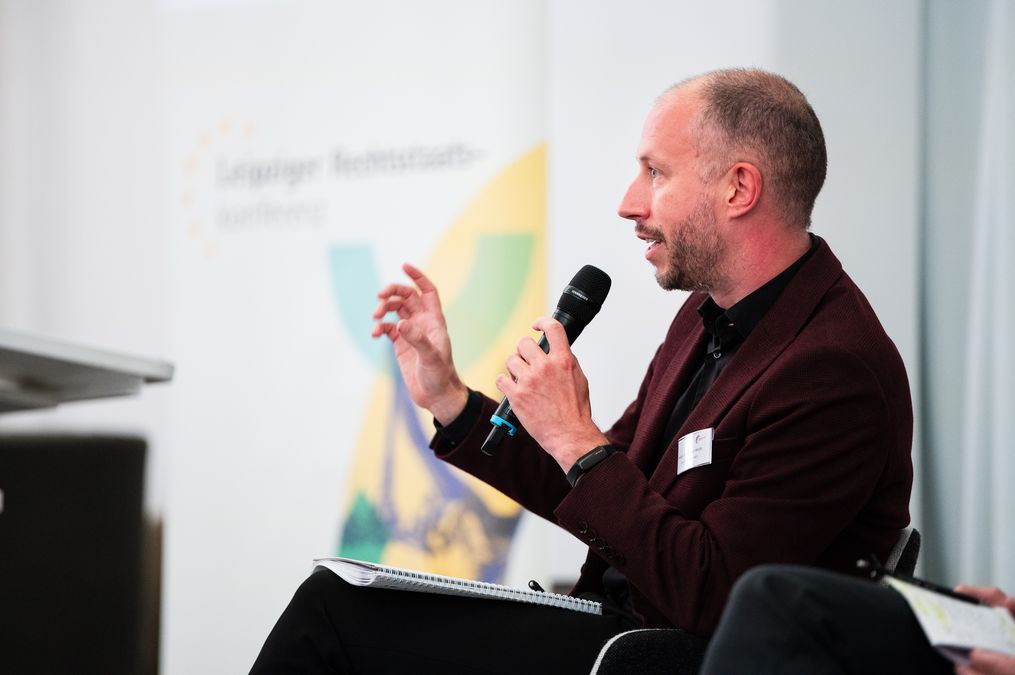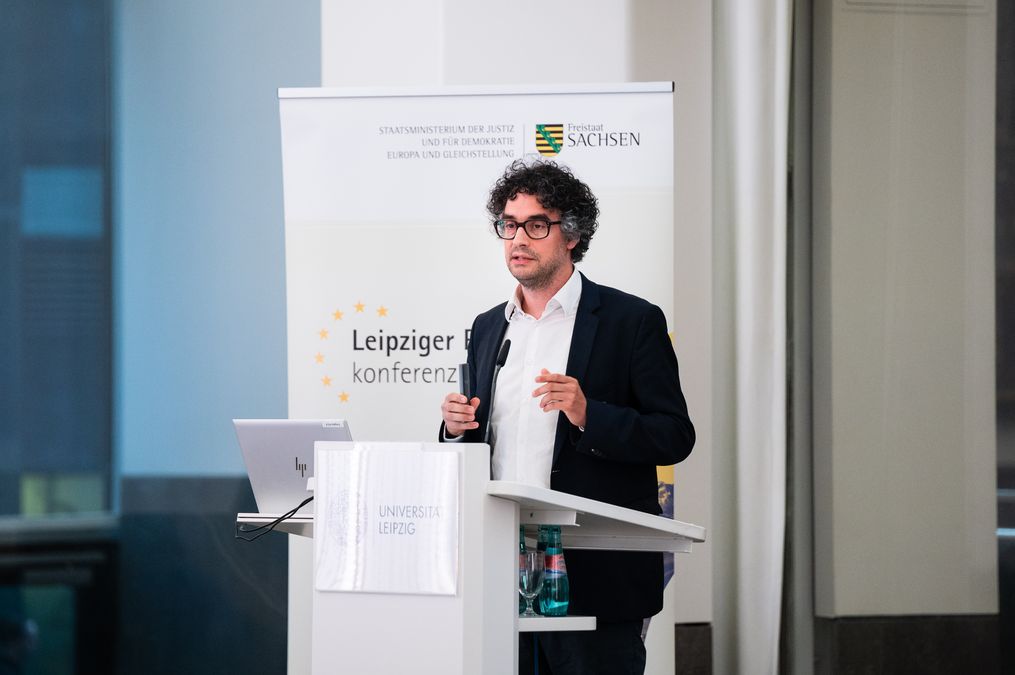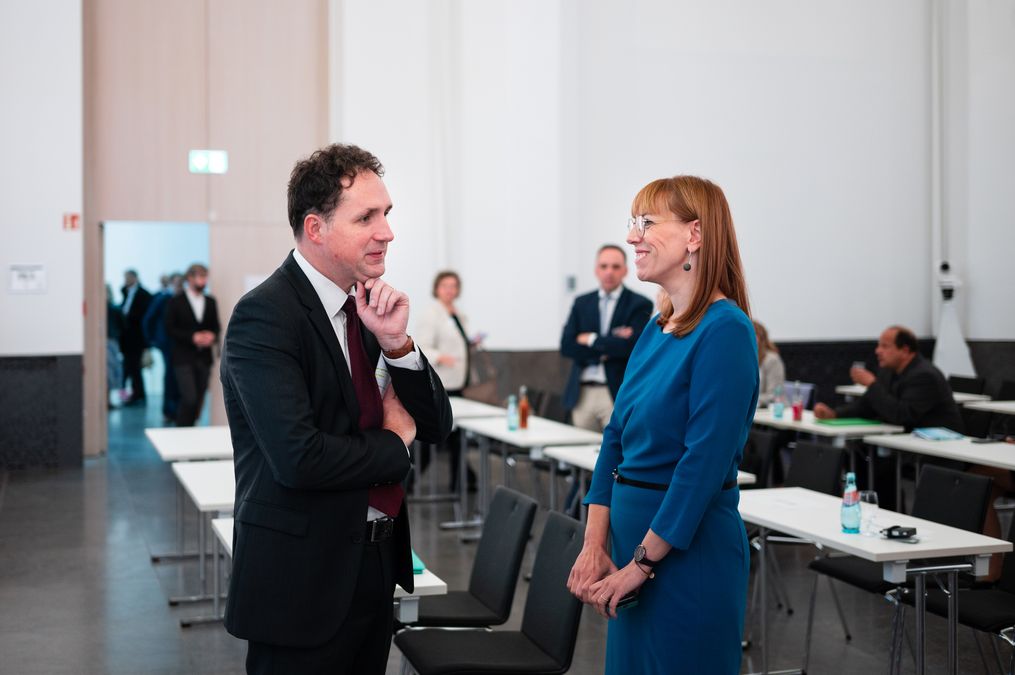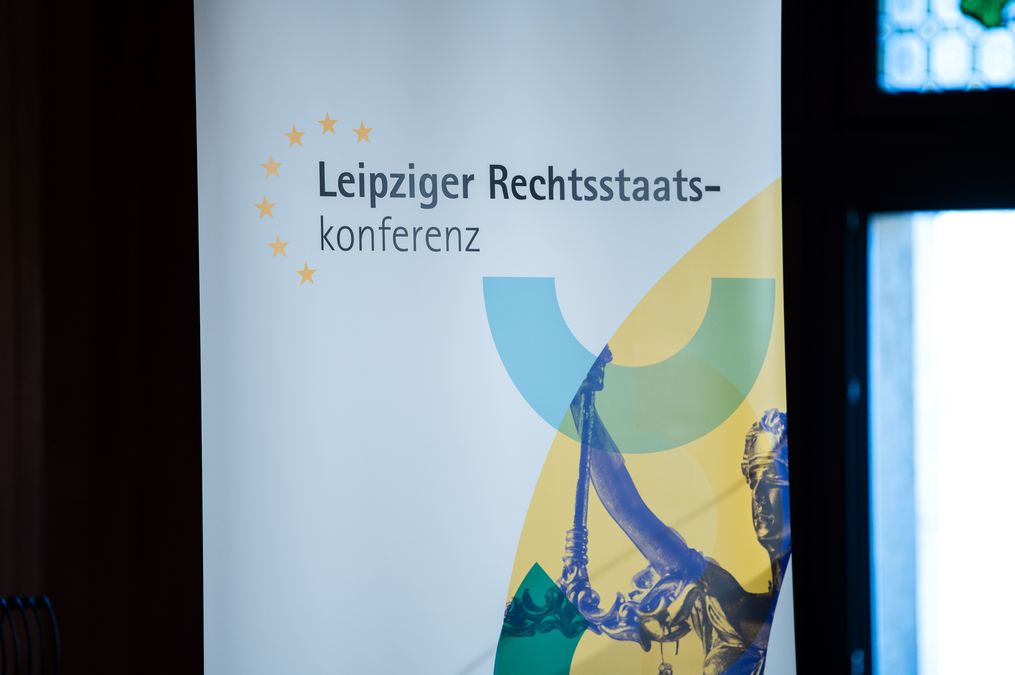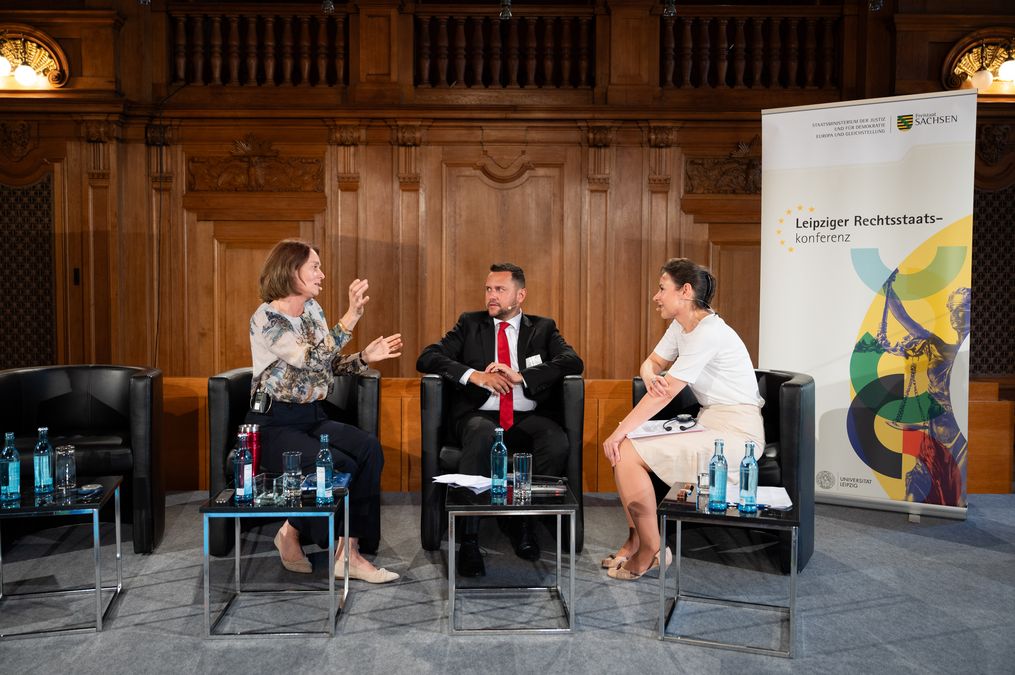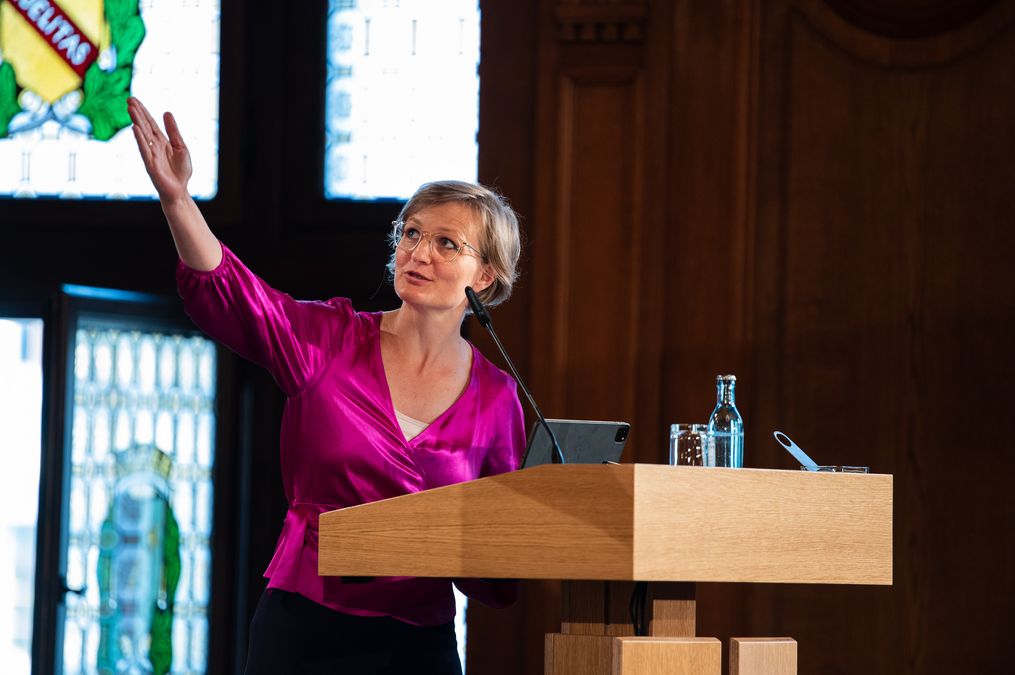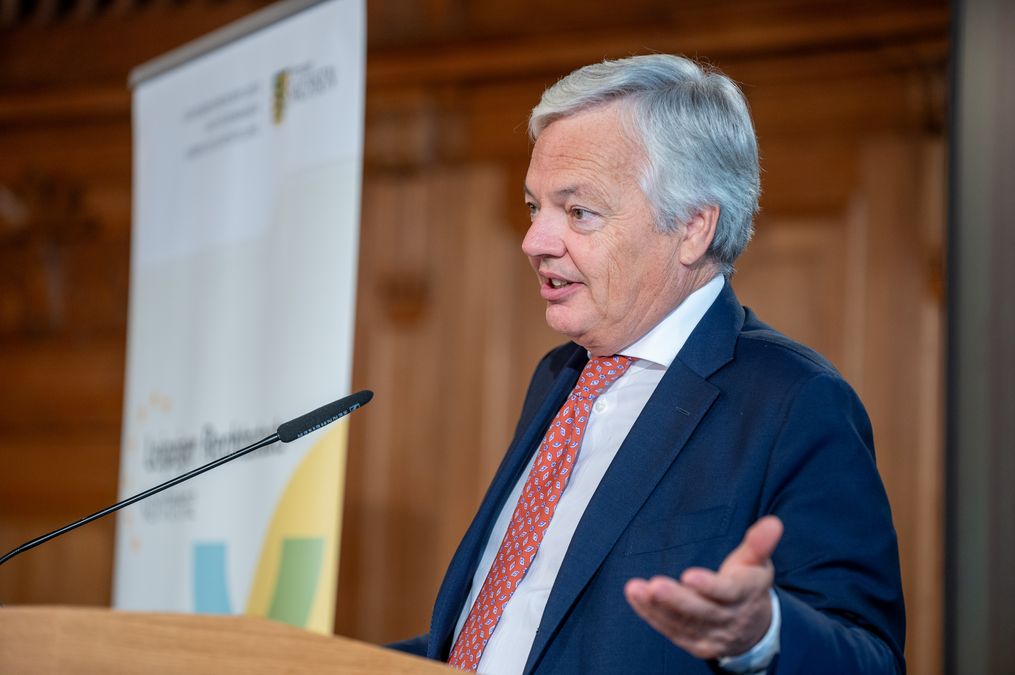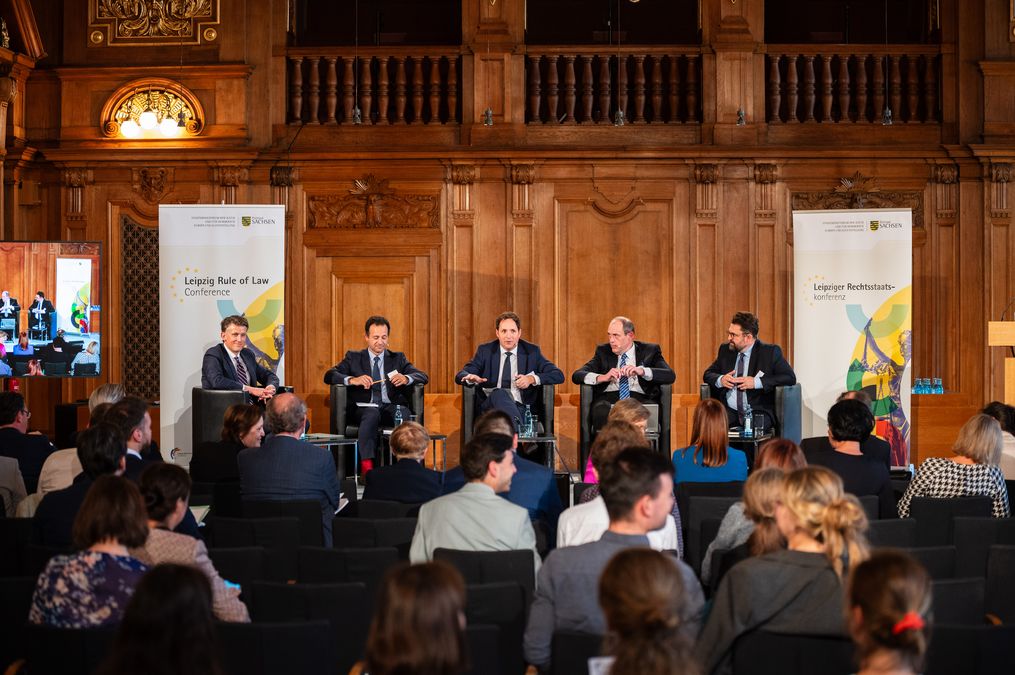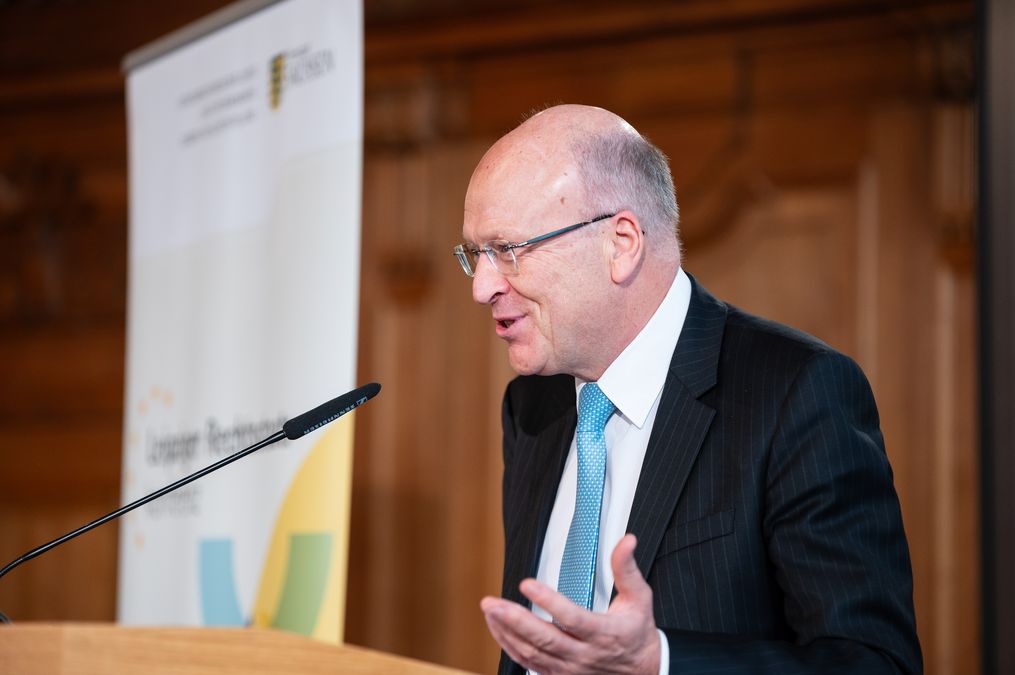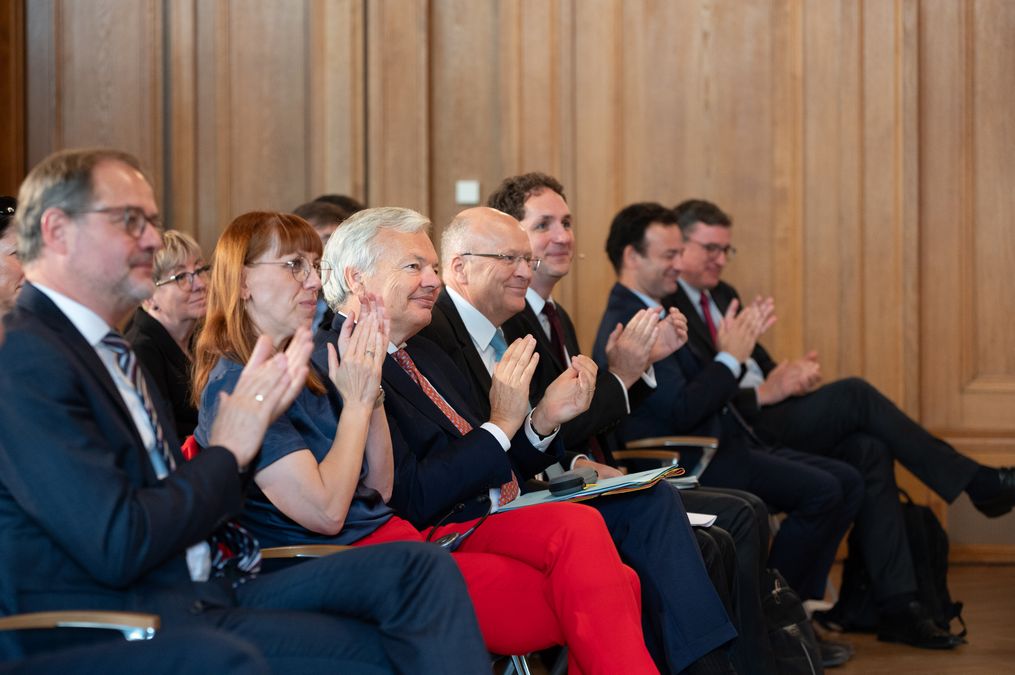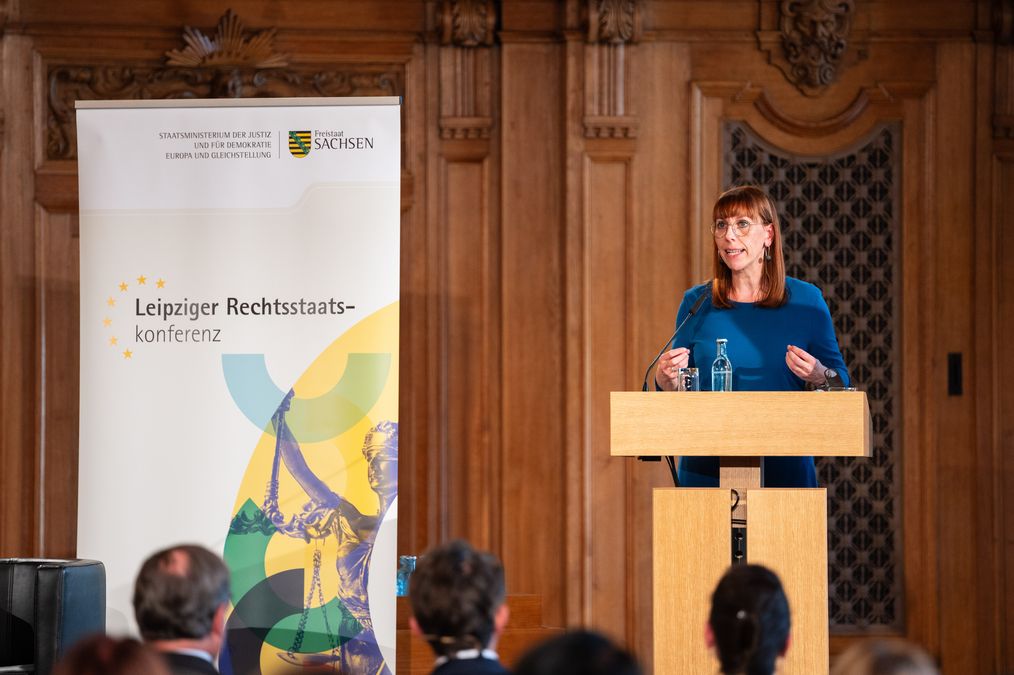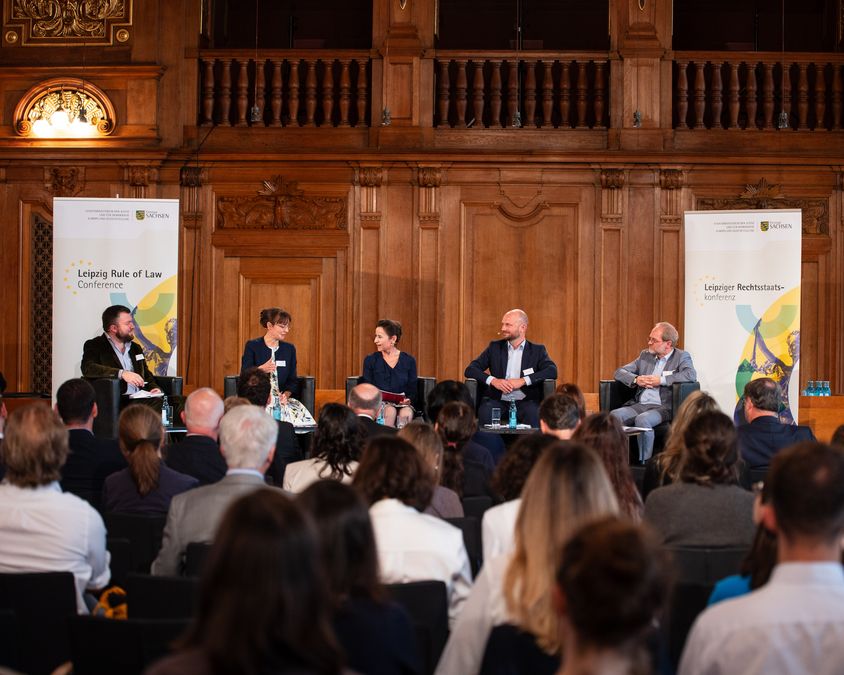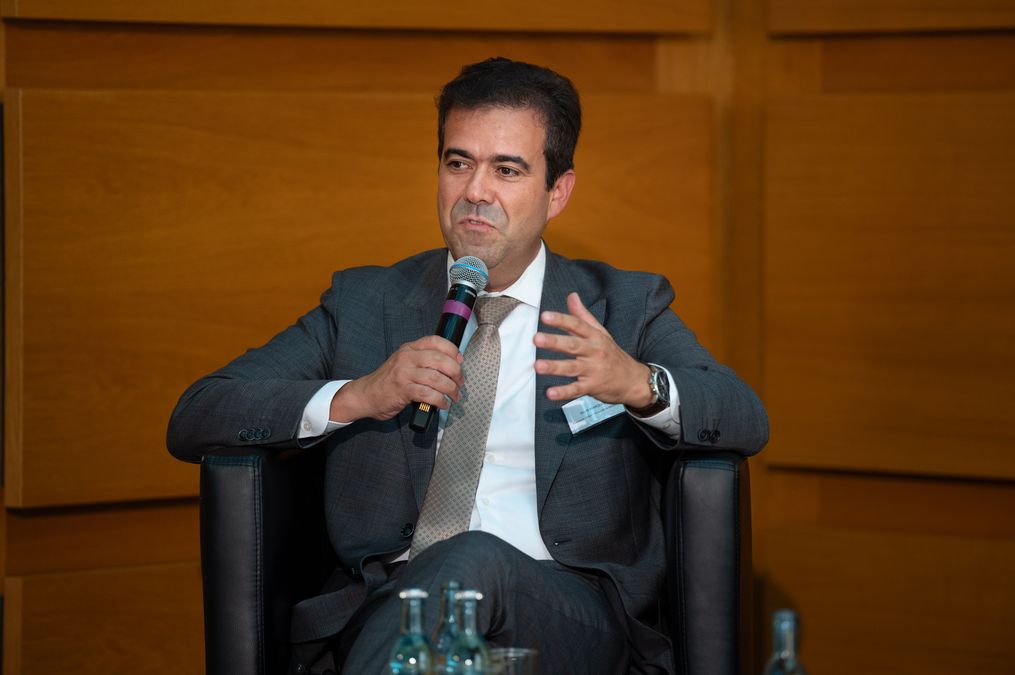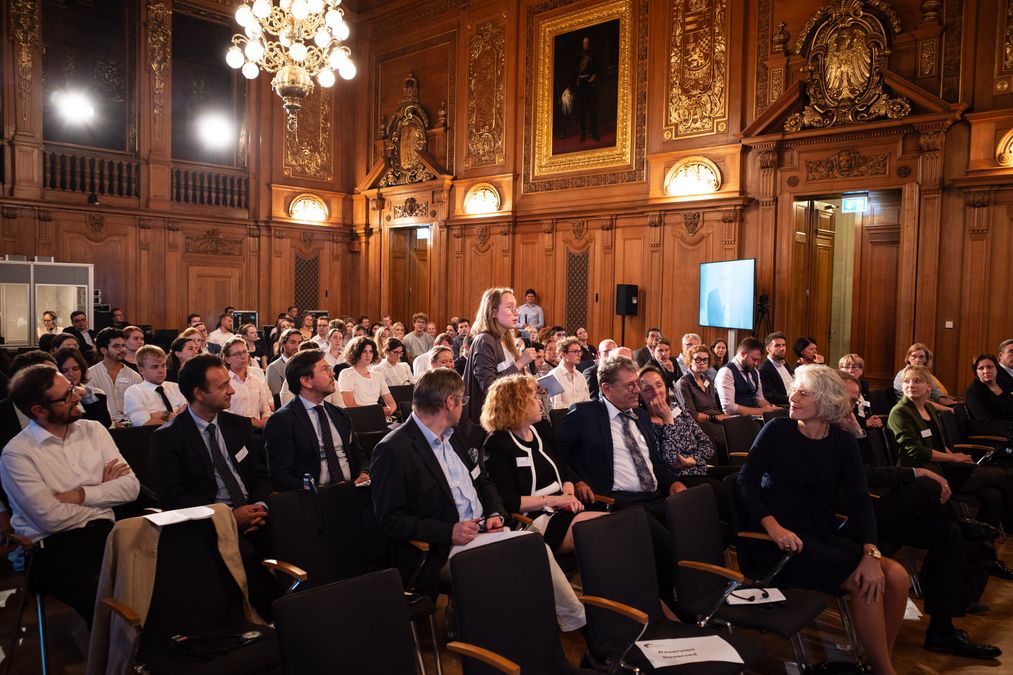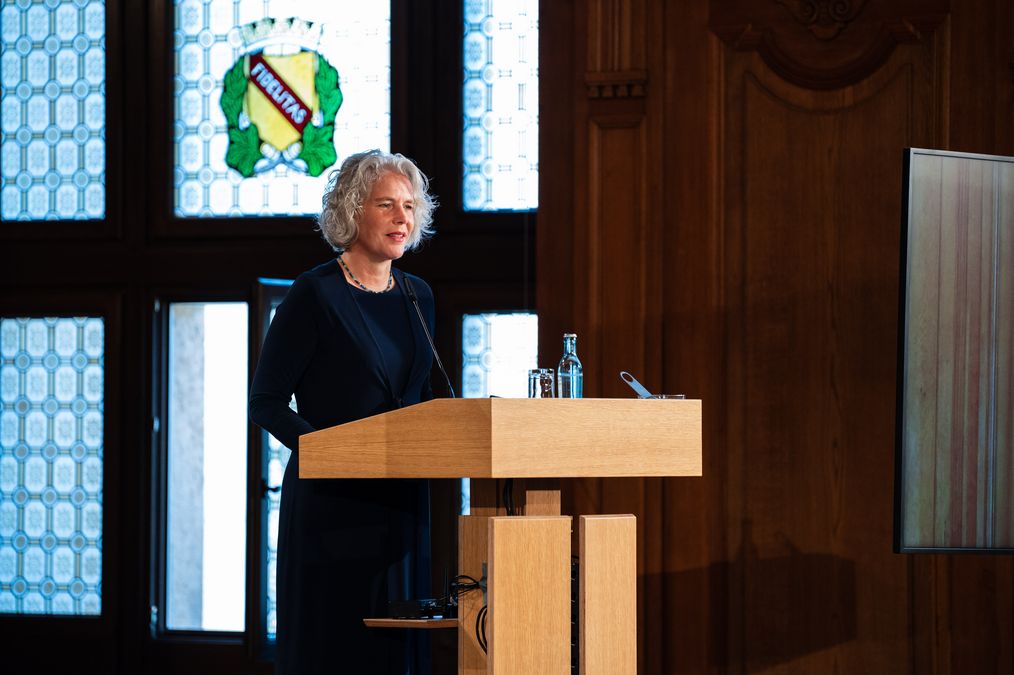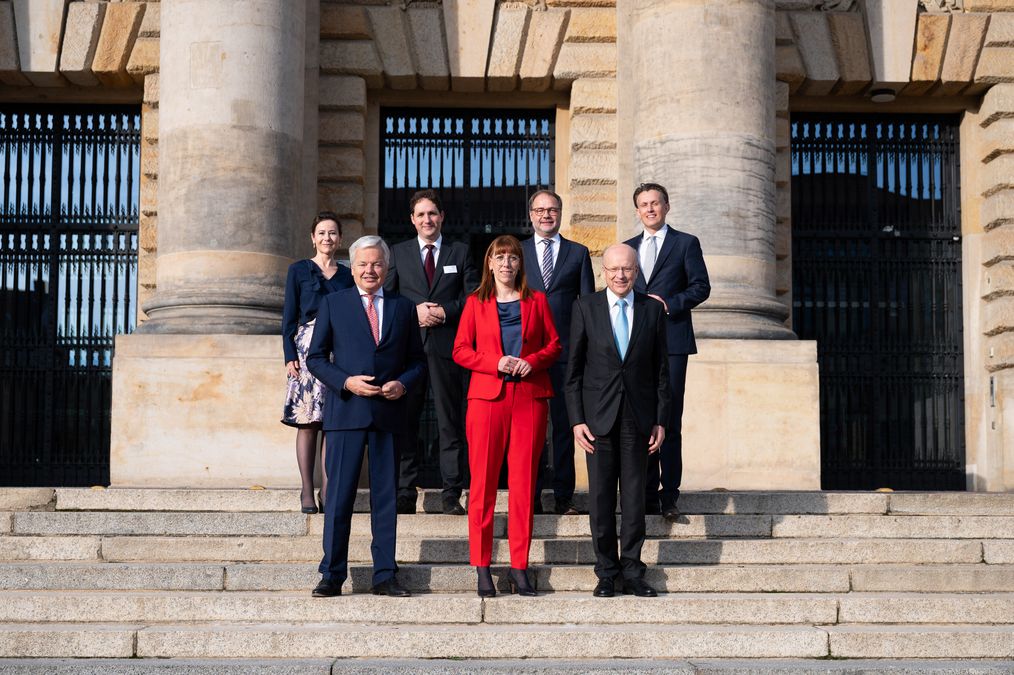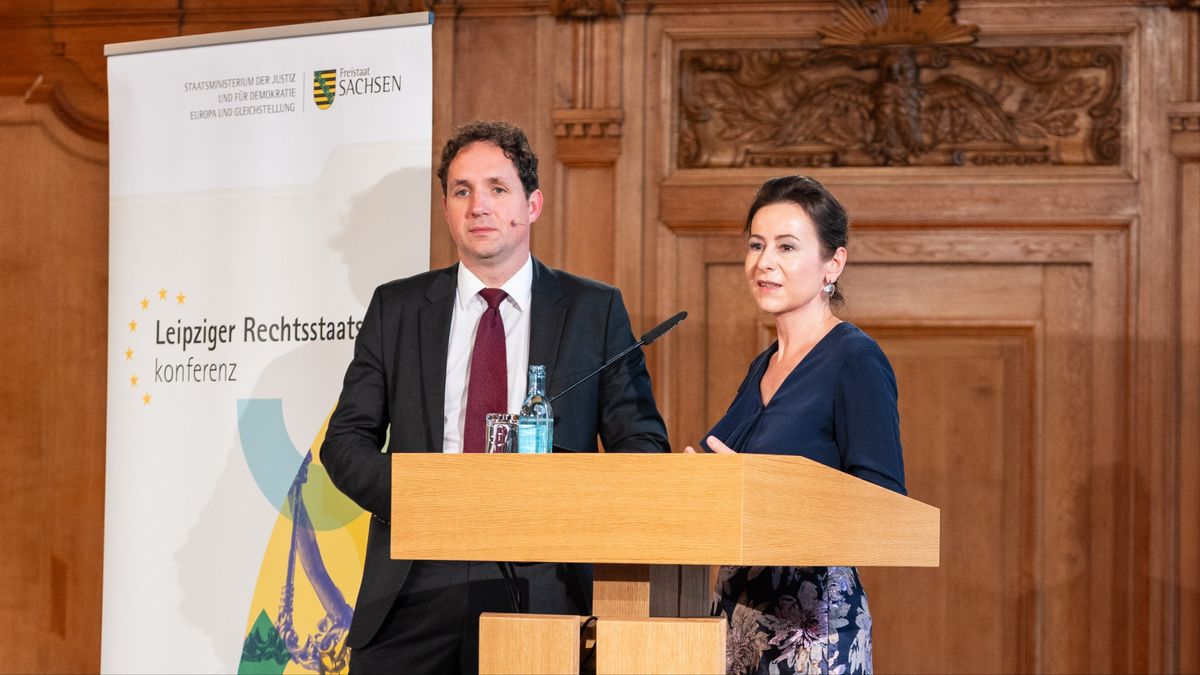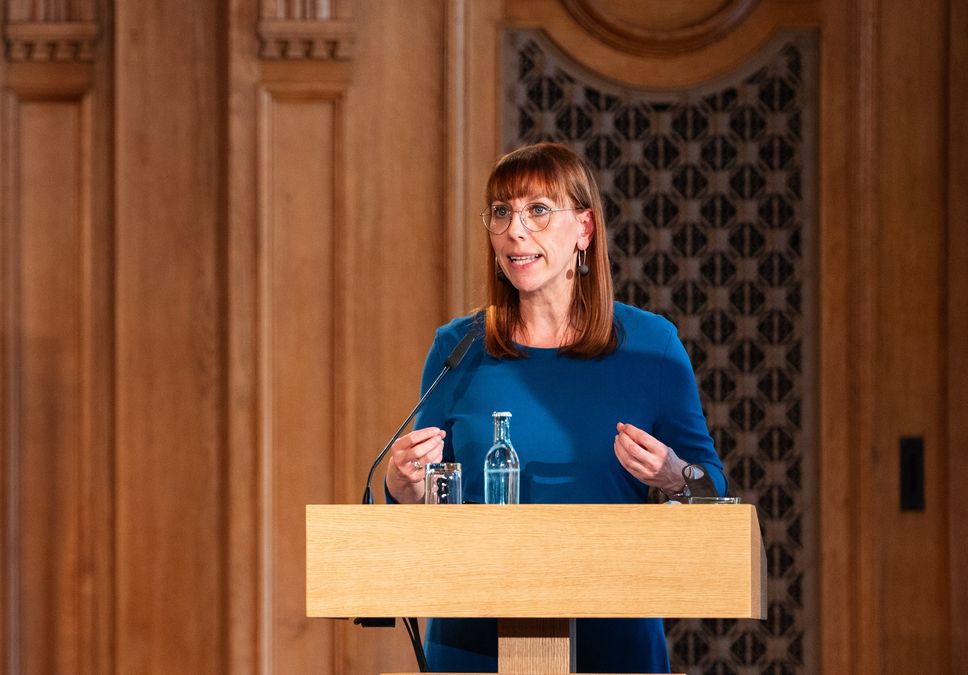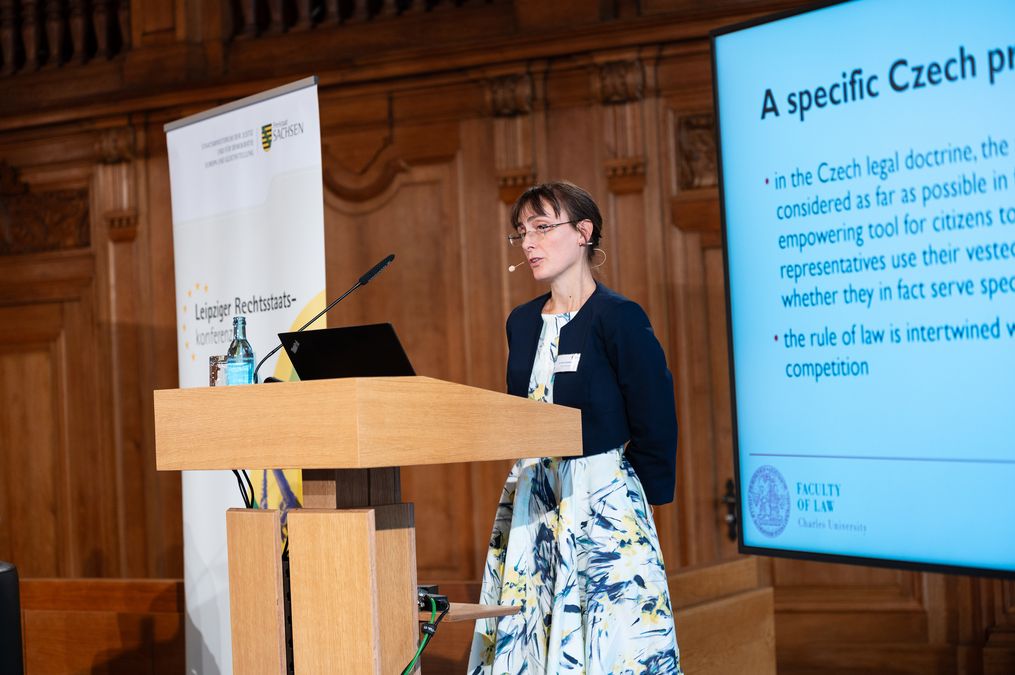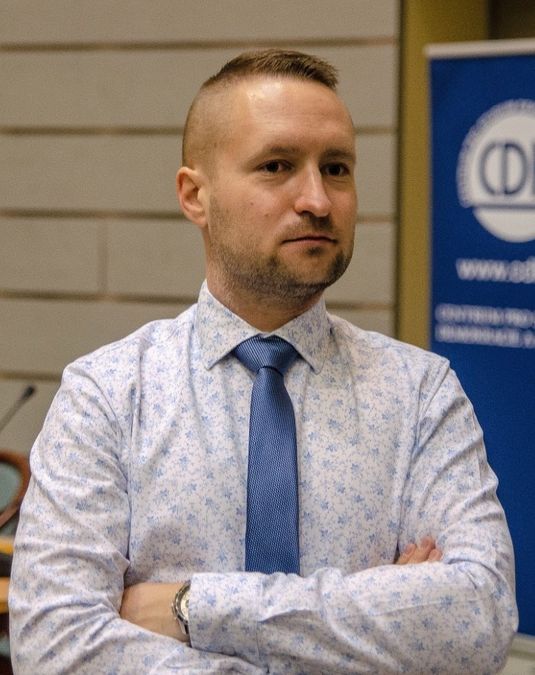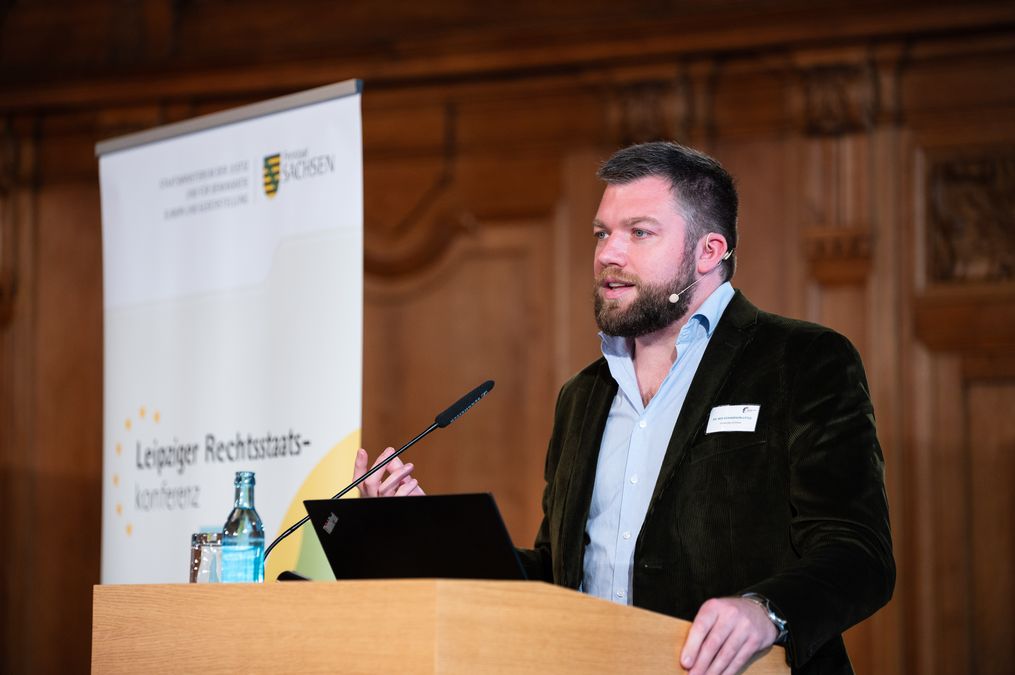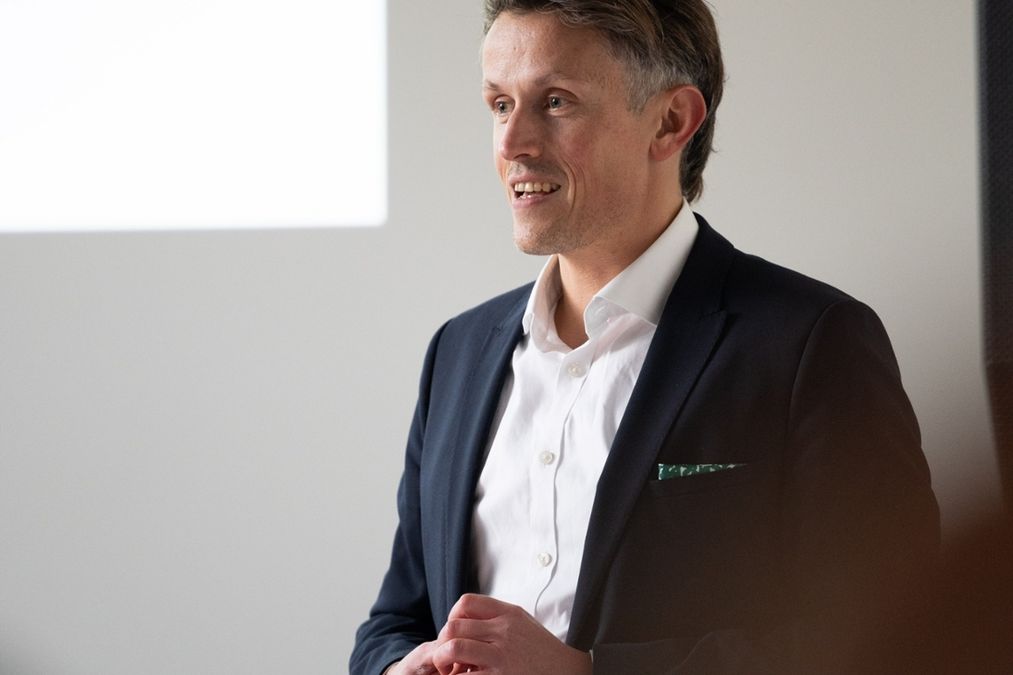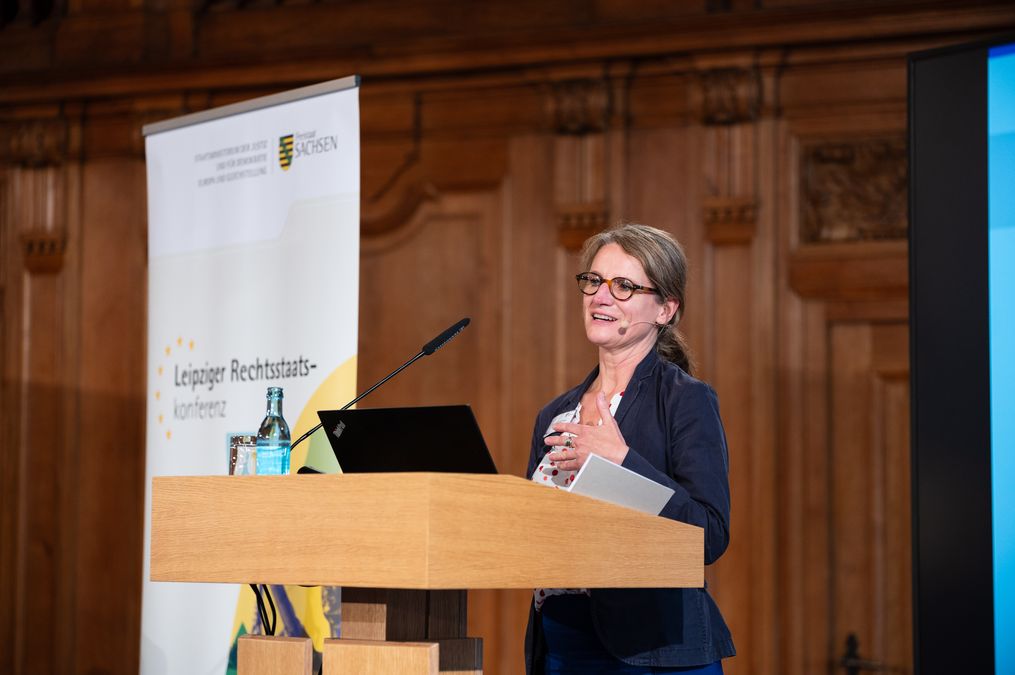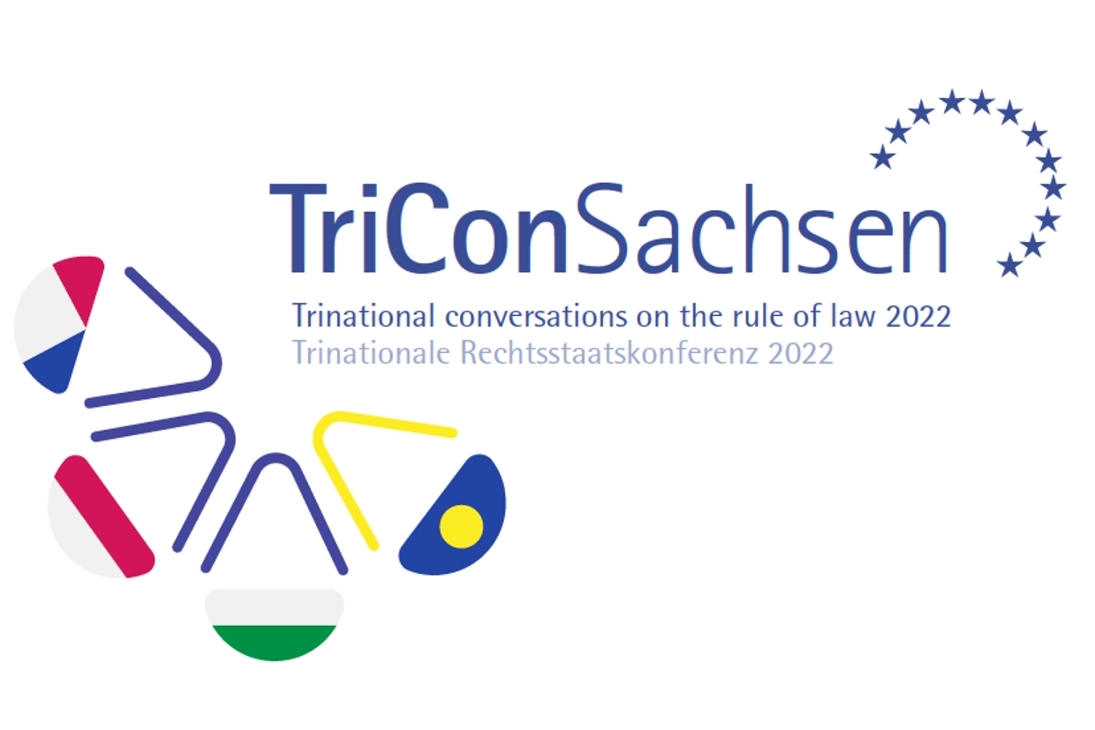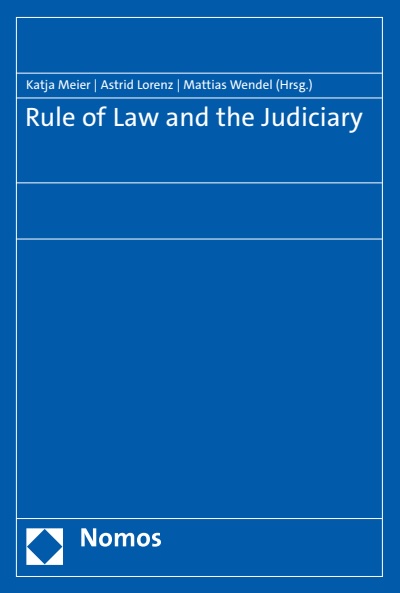The Leipzig Rule of Law Conferences are international forums for exchange on rule of law issues in Europe, jointly organized by the Saxon State Ministry of Justice and for Democracy, Europe and Equality, Prof. Dr. Astrid Lorenz from the Faculty of Social Sciences and Philosophy and Prof. Dr. Mattias Wendel from the Faculty of Law at Leipzig University.
The conferences help to maintain a dialog on commonalities in the development of the rule of law, aim to create and increase mutual understanding when it comes to challenges and potential threats to the rule of law and to discuss ways to address them as well as prospects for the future. We bring together legal and social science perspectives, people from academia, politics, the judiciary and NGOs as well as from different countries. Students are also involved, including in background discussions and in 2023 as part of an international summer school.
The rule of law is one of the fundamental values of the EU, enshrined in Article 2 of the Treaty on European Union. As a community based on the rule of law, the Union depends on these values being shared and respected by its member states. In recent years, however, respect for the rule of law at the national level has increasingly become one of the most pressing issues on the EU agenda.
2024 - A New Era of Rule of Law Challenges
26.09.2024 - 27.09.2024, Leipzig University, Paulinum - Aula
2024, we discussed threats to the rule of law in old EU Member States, how the rule of law can be safeguarded in the course of the next EU enlargement, how (especially in view of the recent change of government in Poland) the rule of law can be restored after a setback, and whether the existing procedures and instruments are suitable for safeguarding the rule of law. The debate once again brought together international legal and social scientists and practitioners. For example, Prof Piotr Girdwoyń, Director of the National School of Judiciary and Prosecution (NSSiP) in Poland, spoke about recent changes in training, and Prof Michal Bobek from the Supreme Administrative Court of the Czech Republic, former Advocate General at the European Court of Justice, argued that a concentrated constitutional court could too easily be 'hijacked' by politicians. Civil society perspectives on the rule of law were presented by Kateryna Ryzhenko, Deputy Executive Director of Transparency International Ukraine, and Sándor Léderer, Director of the anti-corruption NGO 'K-Monitor' in Hungary.
Day 1: 26.09.2024
12:45 - 13:00h: Musical Interlude on the Organ of the Paulinum, Ivo Mrvelj
----------------------------------------------------------------------------------------------------------------------------------------------------------------------------------------------
13:00-13:30h: Opening
• Welcome Speech: Katja Meier, Saxon State Minister of Justice and for Democracy, European Affairs and Gender Equality
• Introduction: Prof. Dr. Astrid Lorenz, Prof. Dr. Mattias Wendel, Leipzig University
----------------------------------------------------------------------------------------------------------------------------------------------------------------------------------------------
13:30 - 14:00h
• Keynote: Prof. Piotr Girdwoyń, Ph.D., National School of Judiciary and Public Prosecution of Poland, Director, Poland
----------------------------------------------------------------------------------------------------------------------------------------------------------------------------------------------
14:00 - 15:15h: Panel I: Turmoil in Old EU Member States – A New State of Rule of Law Regression?
Chair: Prof. Dr. Mattias Wendel, Leipzig University, Germany
• Prof. Dr. Monica Claes, Professor of European and Comparative Constitutional Law at Maastricht University, Netherlands
• Prof. Dr. Pieter de Wilde, University of Groningen, Faculty of Arts, Chair in European Politics & Society, Netherlands
• Prof. Dr. Pietro Faraguna, Associate Professor of Constitutional and Public Law at the University of Trieste, Italy
----------------------------------------------------------------------------------------------------------------------------------------------------------------------------------------------
15:15 - 15:30h Coffee Break
----------------------------------------------------------------------------------------------------------------------------------------------------------------------------------------------
15:30 - 16:30h Panel II: Safeguarding the Rule of Law in the Course of the Next EU Enlargement
Chair: PD Dr. Dietmar Müller, Leipzig University, Germany
• Petru Istrati, Member of the Justice Expert Group at the Institute for European Policies and Reforms, Moldova
• Dr. Marko Kmezić, Centre for Southeast European Studies, University of Graz, Austria
----------------------------------------------------------------------------------------------------------------------------------------------------------------------------------------------
16:30 - 17.00h Coffee Break
----------------------------------------------------------------------------------------------------------------------------------------------------------------------------------------------
17:00 - 18:00h Panel III: Mobilizing Civil Society – Strategies and Opportunities in the Fight for the Rule of Law
Chair: Madeleine Hartmann, Leipzig University, Germany
• Kateryna Ryzhenko, Deputy Executive Director of the NGO “Transparency International Ukraine”, Ukraine
• Sándor Léderer, Director of the Anti-corruption NGO “K-Monitor”, Hungary
----------------------------------------------------------------------------------------------------------------------------------------------------------------------------------------------
18:00 - 19:00h High Level Panel: Societies in Turmoil – Will Courts Rescue Democracy?
Chairs: Prof. Dr. Astrid Lorenz, Prof. Dr. Mattias Wendel, Leipzig University
• Prof. MMag. Michal Bobek, MJur (Oxon), Ph.D. (EUI), Dr.h.c., Supreme Administrative Court, formerly Advocate General at the European Court of Justice, Czech Republic
----------------------------------------------------------------------------------------------------------------------------------------------------------------------------------------------
19:00 - 20:00h Conference Reception
----------------------------------------------------------------------------------------------------------------------------------------------------------------------------------------------
Day 2: 27.09.2024
09:00 - 10:30h: Panel IV: Reestablishing the Rule of Law after Backsliding
Chair: Prof. Dr. Paweł Ireneusz Karolewski, Leipzig University
• Prof. MMag. Michal Bobek, MJur (Oxon), Ph.D. (EUI), Dr.h.c., Supreme Administrative Court, formerly Advocate General at the European Court of Justice, Czech Republic
• Prof. Wojciech Sadurski, Challis Professor in Jurisprudence, University of Sydney and Professor at the Centre for Europe, University of Warsaw, Poland
• Prof. Dr. Ellen Bos, Andrássy University Budapest, Centre for Democracy Studies, Hungary
----------------------------------------------------------------------------------------------------------------------------------------------------------------------------------------------
10:30 - 11:00h Coffee Break
----------------------------------------------------------------------------------------------------------------------------------------------------------------------------------------------
11:00 - 12:30h Panel V: Learning from the Rule of Law Crisis – Towards a European Democracy Toolbox
Chair: Dr. Robert Böttner, University of Halle-Wittenberg, Germany
• Prof. Dr. Ramona Coman, Université Libre de Bruxelles, Belgium
• Prof. Dr. Silvia von Steinsdorff, Humboldt University of Berlin, Institute of Social Sciences, Germany
• Friedemann Zippel, European Court of Auditors, Principal Manager, Chamber 2 Directorate, Investment for cohesion, growth and inclusion, Luxembourg
----------------------------------------------------------------------------------------------------------------------------------------------------------------------------------------------
12:30 - 13:00h Concluding Remarks
• Prof. Dr. Astrid Lorenz, Leipzig University
• Prof. Dr. Mattias Wendel, Leipzig University
2023 – “The Rule of Law - Bridging or Sanctioning Differences?“
28.09.2023 - 29.09.2023, Federal Administrative Court Leipzig | hybrid
In 2023, we talked about the extent to which national differences in rule of law structures can be bridged or whether and how they should be sanctioned more strongly. We took a look at the legal and political situation in different EU Member States and also critically examined processes in academia and politics. Are we asking the right questions? Have viable solutions to the problems been designed? Are we having a sufficient exchange in this regard? We were happy to welcome Koen Laenarts, President of the European Court of Justice, EU Commissioner for Justice Didier Reynders and Katarina Barley, Vice-President of the European Parliament, among others.
Programme
Day 1: 28 Sep. 2023
09:00 - 12:30h: Court Simulation CJEU
- Summer School only
----------------------------------------------------------------------------------------------------------------------------------------------------------------------------------------------
13:00 - 14:00h: Opening
- Prof. Dr. Andreas Korbmacher, President of the Federal Administrative Court
- Prof. Dr. Eva Inés Obergfell, Rector Leipzig University
- Katja Meier, Saxon State Minister of Justice and for Democracy, European Affairs and Gender Equality
- Key Note Speech: Dr. Franziska Brantner, Parliamentary State Secretary at the German Federal Ministry for Economic Affairs and Climate Action
- Introduction: Prof. Dr. Astrid Lorenz, Prof. Dr. Mattias Wendel, Leipzig University
----------------------------------------------------------------------------------------------------------------------------------------------------------------------------------------------
14:00 - 15:30h: Panel - Recent Developments in Legal and Political Perspectives
Chair: Prof. Dr. Mattias Wendel, Leipzig University
- Constitutional and Democratic Resilience (Prof. Dr. Pál Sonnevend, ELTE Budapest, Faculty of Law)
- Judicial Independence (Dr. Paweł Filipek, Polish Academy of Sciences in Warsaw, Institute of Law Studies)
- Countering Rule of Law Backsliding From a European Perspective: How Effective are the New Instruments? (Prof. Dr. Julio Baquero Cruz, European Commission Legal Service and Université Libre de Bruxelles)
- Civil servants and the Rise of Anti-constitutional Sentiment in Germany: Reclaiming the Rule of Law (Mathias Weilandt, State Secretary, Saxon State Ministry of Justice, Democracy, European Affairs and Gender Equality)
----------------------------------------------------------------------------------------------------------------------------------------------------------------------------------------------
16:00 - 17:00h: Parallel Panels
A) Debating the Academic Debates in Law and Political Sciences
Chair: Prof. Dr. Astrid Lorenz, Leipzig University
- Containing the Illiberal Backlash: The Debate on the Role of Constitutional Courts in the ECE Countries (Prof. Dr. Petra Guasti, Charles University in Prague, Faculty of Social Sciences)
- Bridging or Sanctioning Differences? The Debates in Political Sciences – A view from outside ECE (Prof. Dr. César Colino, UNED, Political Science Department)
- Bridging or Sanctioning Differences? The Debates in Legal Scholarship (Prof. Dr. Päivi Leino-Sandberg, University of Helsinki, Faculty of Law)
B) Debating Civil Society Revolt Against Rule of Law Challenges
Chair: Dr. Claudia Matthes, Humboldt-University Berlin, Institute of Social Sciences
- Judicial Activism against Rule of Law Restrictions in Poland (Sylwia Gregorczyk-Abram, Wolne sądy, Free Courts Organization Poland)
- Defending the Rule of Law before the ECJ (Filipe Marques, Judge and former President of the European Judges Association MEDEL)
- Protection and Europeanization of Civil Society and the Role of the European Parliament (Dr. Sergey Lagodinsky, Member of the European Parliament, Vice-Chair Committee on Legal Affairs)
C) Roundtable of the Saxon Minister of Justice with Participants of the Summer School (internal)
----------------------------------------------------------------------------------------------------------------------------------------------------------------------------------------------
17:15 - 18:45h: Panel Discussion „Safeguarding the Rule of Law – What Results?“
Chairs: Prof. Dr. Astrid Lorenz, Prof. Dr. Mattias Wendel, Leipzig University
- Dr. Katarina Barley, Vice-President of the European Parliament
- Viktor Vadász, Deputy Director and Director of Programmes of the Academy of European Law (ERA), former Hungarian judge and former spokesperson of the National Judicial Council
- Igor Tuleya, Judge at the District Court of Warsaw
----------------------------------------------------------------------------------------------------------------------------------------------------------------------------------------------
----------------------------------------------------------------------------------------------------------------------------------------------------------------------------------------------
Day 2: 29 Sep. 2023
09:00 - 09:45h: Start of Day 2
Chair: Prof. Dr. Astrid Lorenz, Prof. Dr. Mattias Wendel, Leipzig University
- The Rule of Law and Fundamental Rights (Prof. Dr. Koen Lenaerts, President of the Court of Justice of the European Union)
- Rule(s) of Law? A View From the Commission (Didier Reynders, European Commissioner for Justice)
----------------------------------------------------------------------------------------------------------------------------------------------------------------------------------------------
09:45 - 11:30h: Panel - Regional or National Peculiarities in Understanding the Rule of Law?
Chair: Prof. Dr. Astrid Lorenz, Leipzig University
- Historicizing the Constitutional Crisis in Poland: The Spectrum of Critical Discourses (Dr. Naum Trajanovski, University of Warsaw, Faculty of Sociology)
- The Rule of Law – a Czech Perspective (Dr. Jana Ondřejková, Charles University in Prague, Faculty of Law)
- Rule of Law as the Rights of the Volk: Human Rights, the Basic Law and the Far-Right since German Reunification (Dr. Ned Richardson-Little, University of Erfurt, Department of History)
- Rule of Law Narratives in East Central Europe (Prof. Dr. Astrid Lorenz, PD Dr. Dietmar Müller and Jan Němec, PhD, Leipzig University, Institute of Political Science)
----------------------------------------------------------------------------------------------------------------------------------------------------------------------------------------------
11:45 - 13:15h: Panel - Defining Rule of Law Standards – Understanding Entanglements between EU Law and Domestic Law
Chair: Prof. Dr. Mattias Wendel, Leipzig University
- Between Conceptual Autonomy and Constitutional Traditions: Defining Rule of Law Standards in Terms of EU Law (Prof. Dr. András Jakab, University of Salzburg, Department of Public, International and European Law)
- Judicial Activism against Rule of Law Challenges and its Effects on Defining Rule of Law Standards (Dr. Claudia Matthes, Humboldt-University Berlin, Institute of Social Sciences)
- Rule of Law Standards and the Preliminary Ruling Procedure: A View From Legal Practice (Dragos Calin, Judge at Bucharest Court of Appeal and Co-chair of the Romanian Judges Forum)
- Illiberal Democracy as a transformative tool to change Rule of Law Standards (Prof. Renáta Uitz, Professor of law and government, Department of Law and Criminology, Royal Holloway, University of London and senior research fellow, CEU Democracy Institute)
----------------------------------------------------------------------------------------------------------------------------------------------------------------------------------------------
13:15 - 13:30h: Conclusion and Open Questions
- Bridging or Sanctioning Differences? (Prof. Dr. Astrid Lorenz, Prof. Dr. Mattias Wendel, Leipzig University)
- Concluding Remarks (Katja Meier, Saxon State Minister of Justice and for Democracy, European Affairs and Gender Equality)
PDF downloads of papers:
-
Greeting from State Secretary Katja Meier:
The Rule of Law: Bridging or Sanctioning Differences? -
Jana Ondřejková (Prague):
The Rule of Law – the Czech Perspective -
Marián Sekerák (Prague):
Rule of Law deficiencies and challenges in Slovakia -
Ned Richardson Little (Erfurt): Rule of Law as the Rights of the Volk: Human Rights, the Basic Law and the Far-Right since German Reunification
-
State Secretary Mathias Weilandt:
Public servants and the rise of anti-constitutional sentiment in Germany: Reclaiming the rule of law -
Claudia-Y. Matthes (Berlin):
Judicial Activism affecting Rule of Law Standards and how the European Union can create better Conditions for the Operation of Civil Society
2022 – “Rule of Law and the Judiciary in the EU Member States: Interdisciplinary and Comparative Perspectives“
28.01.2022, Media City Atelier Leipzig | hybrid
Are judges and public prosecutors in Germany politically independent? Will Poland abolish the disciplinary chamber again because the EU no longer disburses funds to Warsaw until this happens? How to protect the courts from undue external influence? We discussed these and other topics in 2022. The contributions analyzed the situation in different EU Member states, with a particular focus on Germany, Poland and the Czech Republic, in the context of EU law. They also took into account legal cultures and contexts, such as the transition to democracy and a market economy. Speakers included Prof. Dr. Adam Bodnar, former Commissioner for Civil Rights (Ombudsman) of the Republic of Poland, Prof. Dr. Ivo Šlosarčík from Charles University in Prague, Bettina Limperg, the President of the Federal Supreme Court, Prof. Dr. Klaus Rennert, the former President of the Federal Administrative Court, and Prof. Dr. Anna Śledzińska-Simon from the University of Wrocław, among others.
09:00h: Opening
- Katja Meier, Minister of Justice, Democracy, European Affairs and Gender Equality
- Anna Lührmann, Minister of State for Europe and Climate
- Prof. Dr. Astrid Lorenz, Leipzig University
- Prof. Dr. Mattias Wendel, Leipzig University
----------------------------------------------------------------------------------------------------------------------------------------------------------------------------------------------
09:30 - 11:00h: Panel 1 - Foundations and Challenges
Chair: Prof. Dr. Stephanie Schiedermair, Leipzig University
- The Rule of Law: Concepts and Perceptions I Prof. Dr. Astrid Lorenz and Dr. Lisa H. Anders, Leipzig University
- Rule of Law: Current Challenges in (Central) Europe I Prof. Dr. Ivo Šlosarčík, Charles University Prague
- The Rule of Law and the National Judiciary Through the Lens of EU Law I Prof. Dr. Mattias Wendel, Leipzig University
----------------------------------------------------------------------------------------------------------------------------------------------------------------------------------------------
11:30 - 11:50h: Keynote
- Appointment of judges between politics, independence and professionalism I Prof. Dr. Dr. h.c. Klaus Rennert, President of the Federal Administrative Court (ret.)
----------------------------------------------------------------------------------------------------------------------------------------------------------------------------------------------
11:50 - 01:15h: Panel 2 - Appointment and status of judges and public prosecutors
Chair: PD Dr. Konrad Duden, Max Planck Institute Hamburg
- Justices at German Land Constitutional Courts. Appointment and Status I Prof. Dr. Werner Reutter, Martin Luther University Halle-Wittenberg
- Old and New Problems in Judicial Appointments: Clashing Visions and Conflicting Goals I Dr. Michał Krajewski, University of København
- Do we need a Judicial Council? Judicial Governance as a Fourth Power I Dr. Katarína Šipulová, Masaryk University Brno
----------------------------------------------------------------------------------------------------------------------------------------------------------------------------------------------
02:00 - 02:20h: Keynote
- Prof. Dr. Adam Bodnar, Ombudsman for Human Rights of the Republic of Poland (ret.)
----------------------------------------------------------------------------------------------------------------------------------------------------------------------------------------------
02:20 - 04:00h: Panel 3 - Judicial Independence
Chair: Dr. Lisa H. Anders, Leipzig University
- Czech perspective I Dr. Ladislav Vyhnánek, Masaryk University Brno
- Comparative Perspectives I Prof. Dr. Christoph Hönnige, Leibniz University Hanover
- Polish Perspective I Assoc. Prof. Dr. Anna Śledzińska-Simon, University of Wrocław
- Perspective of the Council of Europe I Prof. Dr. Anne Sanders, Bielefeld University
-
Katja Meier, Astrid Lorenz & Mattias Wendel (eds.) (2023). Rule of Law and the Judiciary, Baden-Baden: Nomos (Open Access).
-
Katja Meier, Astrid Lorenz & Mattias Wendel (Hrsg.) (2023), Rechtsstaatlichkeit und die Justiz, Leipzig: Universität Leipzig (Open Access).
Information Material on the Rule of Law
A number of politicians in Europe, notably from government parties in Poland and Hungary, are challenging established conceptions around the rule of law – the framework guaranteeing accountable governments and equal citizens’ rights. The challengers pretend that the rule of law is a mere buzzword and claim that it is a political tool used to target them and their political agendas without justification. Other EU governments –most notably Spain, Greece and Romania– have at times sought to weaken independent oversight institutions, failed to implement necessary reforms or dismissed rule of law concerns.
Politicians’ claims are packed with myths, lies and half-truths that hinder constructive debates around the rule of law. Our updated “Rule of Law FAQs” will help politicians, journalists, and other actors engaged in the European rule of law debate navigate these muddy waters. Get your facts straight and let’s bust some myths!
Download the FAQ in English and German:

